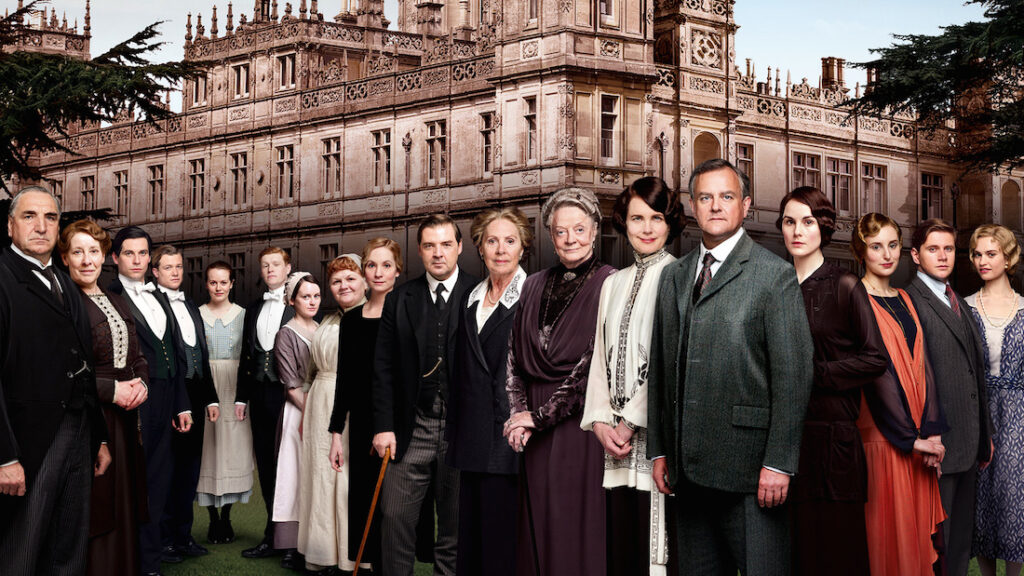The weekend after the Oscars, I felt the damp grey clouds of mourning descend upon me. My soul lamented that grace and goodness were a thing of the past: “Downton Abbey” said its farewell on PBS. I own a white costume that approximates the lovely Countess Grantham, Cora, as she was during that first season. Yet I had only entered the world of butlers, lady’s maids, footmen, countesses, ladies and lords and good manners because Roger Ebert wrote a blog essay on “Downton Abbey” in 2012. After reading it, I began binge-watching “Downton Abbey” on Netflix thanks to the Roku that Roger insisted I get. Saying farewell to “Downton Abbey” is not unlike saying farewell to a bit of Roger.
Roger titled his “Downton Abbey” blog entry, “Think of me as the butler, Carson.” Roger fancied himself the man who was the gatekeeper of society, the loyal guardian of the master of the house and the middleman of the world upstairs and downstairs. Re-reading that blog entry made me think of the novel “Remains of the Day.” Are critics all gatekeepers of art, graciousness and good living?
Roger found Bates, Lord Grantham’s valet, as the most admirable man, but one with too active a conscience. Roger died just as season three had been broadcast on PBS—before he could see that Bates and his wife lived under a troubled relationship with the law, but were ultimately found innocent of all wrong-doing. Bates has suffered but mostly remained the same in character.
When Roger died, Thomas Barrow was still vile, and yet, of all the characters of “Downton Abbey,” he has changed the most. Roger wrote, “There is nothing Politically Correct about ‘Downton Abbey.’ Thomas is not only a liar and a thief, but a deceiver of young women, an aggressive homosexual, and a chain smoker. He teams up with her ladyship’s maid, Mrs. O’Brien, to share smokes and plot against Bates.”
Roger found something comforting about the “the great Yorkshire structure and its traditions.” He wrote, “For an hour a night, it was mine. Yes, in the embrace of these ancient yellow stones and rich woods, the footsteps of countless ancestors had fallen. It mattered not if I swept the entrance or stood in it to welcome the Queen, I was there through the generations.” I lived for a year in South Yorkshire, but don’t remember it fondly although I recall some friendships where we bonded over home-cooked meals. Mostly I treasure wonderful excursions to Scotland and, finally, France.
I’m not so in love with some of the ancient values, but I will miss one: Manners and the ability to disagree without descending into vulgarities and crass behavior (Lady Edith went that way when she called Lady Mary a “bitch” but at least that was done in private). Can we all be more gracefully Downton Abbey-ish by using wit and words and even kindness to win the day as we go forward? Barrow’s lessons in kindness might have pleased Roger. In his blog entry, “Go Gentle into that Good Night,” he wrote, “‘Kindness’ covers all of my political beliefs. No need to spell them out. I believe that if, at the end of it all, according to our abilities, we have done something to make others a little happier, and something to make ourselves a little happier, that is about the best we can do. To make others less happy is a crime. “
When you think of the changes met by the Crawleys and their servants between 1913 to 1925 at Downton Abbey, the first season and the final season finds them in almost different worlds. The dowager had to learn about new concepts like the weekend and new contraptions like telephones (“Is this an instrument of communication or torture?”). Like them, with the Internet, Twitter and Facebook, smartphones and iPads, we are in a world of many changes, where communication is easy, but manners are not. When I was in high school, being snarky was a defense mechanism and I greatly admired Dorothy Parker, but today, I feel that was a mistake. What I learned from “Downton Abbey,” Miss Manners and Emily Post is that one can be gracious and polite, while being strong and even witty.
On “Downton Abbey,” the dowager proved that, but she also knew herself well enough. Once she had said regrettable things and lost a great battle, she took herself away. She confides to Isobel in episode seven of season six, “I am angry at the way I have been treated. While angry, I say things some people find hard to forgive. So, I have decided to go away. I’d rather vent my rage on the desert air and return when I’ve regained control of my tongue.” This might be wise advice to people whose fingers twitch to put their anger and angst out on Twitter. Before she leaves, she selects a puppy and has her butler deliver it to her son, Robert, whose dog had recently died from cancer.
As the “Downton Abbey” specials on manners indicate, expected behavior could be restrictive. That isn’t necessarily a bad thing. In the past, the dowager was able to put us in our place, “Don’t be defeatist, dear, it’s very middle class,” but also noted “If I were to ever search for logic I wouldn’t look for it amongst the English upper class.” We talk about class, classics and being classy, but what does that mean to us today?
Perhaps we should all be more self-aware like the dowager. Consider that while in 1925 one’s words might have lived on only in memory (unless written down on a letter and sent to a foreign embassy), in today’s world, rash words can live on forever, hauntingly so, even becoming memes. The dowager told her granddaughter Sybil once, “Vulgarity is no substitute for wit.” Violet, however, could still be kind as she was with the dying William Mason, to Tom when he was drugged by Larry Grey and with the unemployed Moseley. She once told Mary, “My dear, a lack of compassion can be as vulgar as an excess of tears.” If one could have the best of two strong women, it would be somewhere between the Cora, the Countess of Grantham and Violet, the dowager Countess. I would then be their daughter, if the deceased Lady Sybil had lived.
This week, I’d like to thank Roger for introducing me to this series, and consider that saying goodbye to the Crawleys and Roger doesn’t mean I can’t have them in my life forever in little ways. If there’s a moral to be learned from “Downton Abbey,” perhaps it is this: Going forward, into this modern world of tweeting and non-deleting, it’s best to remember one can’t always make amends for poor behavior with a puppy.












